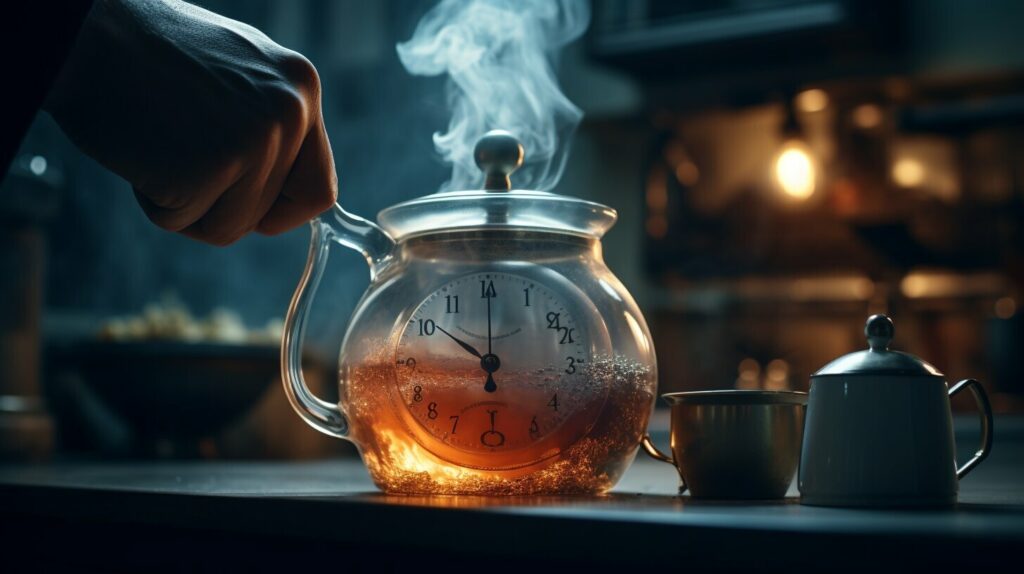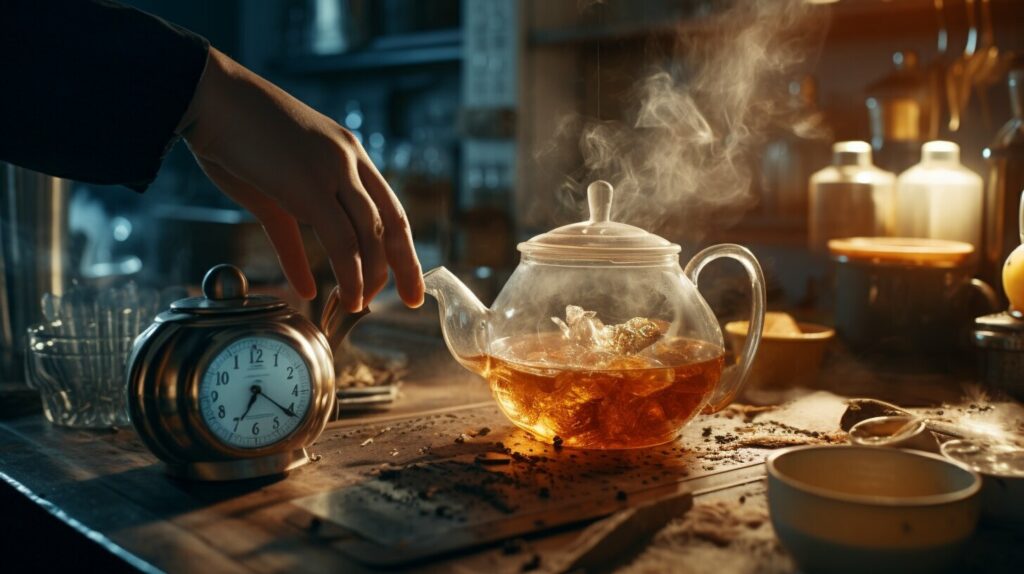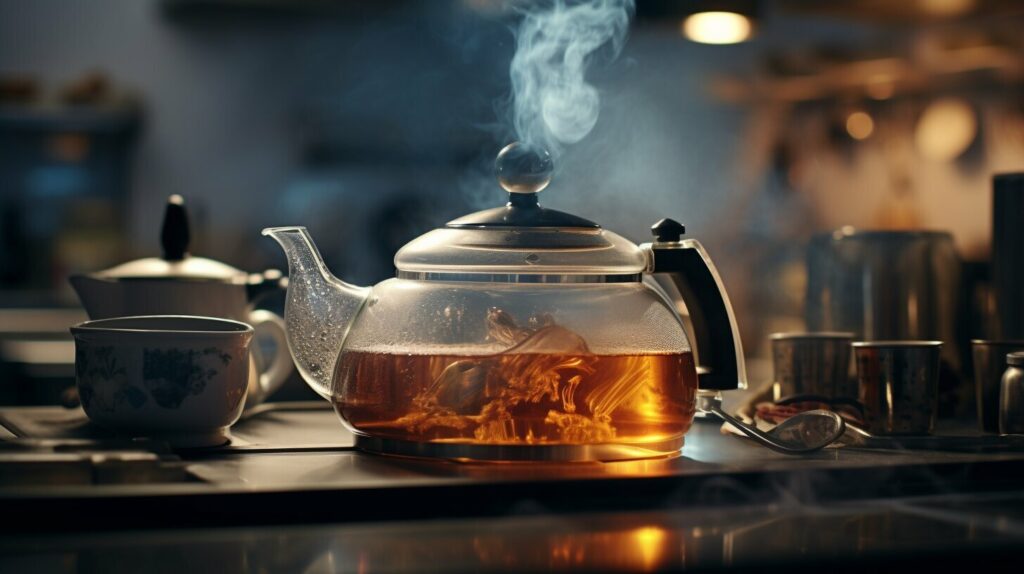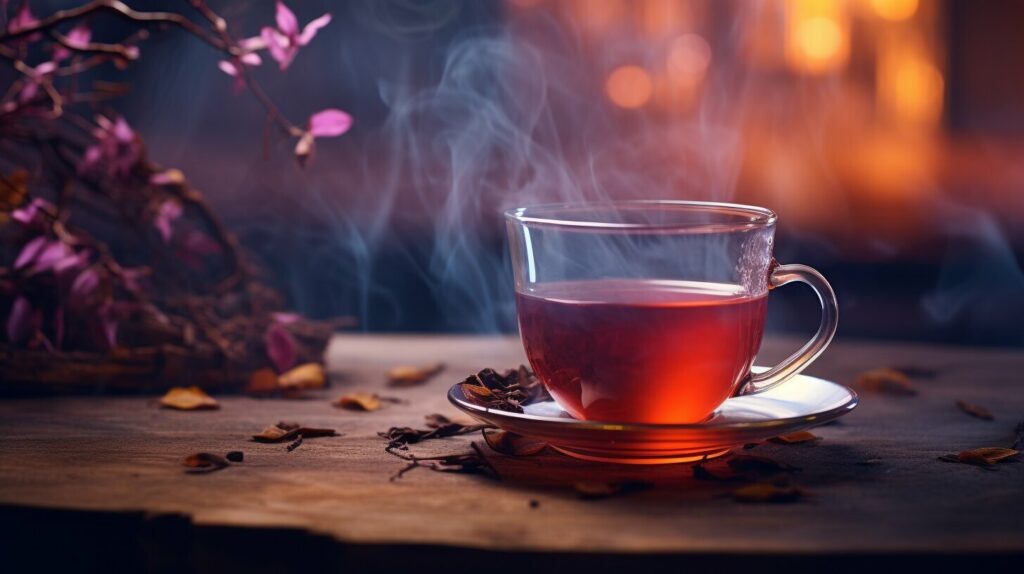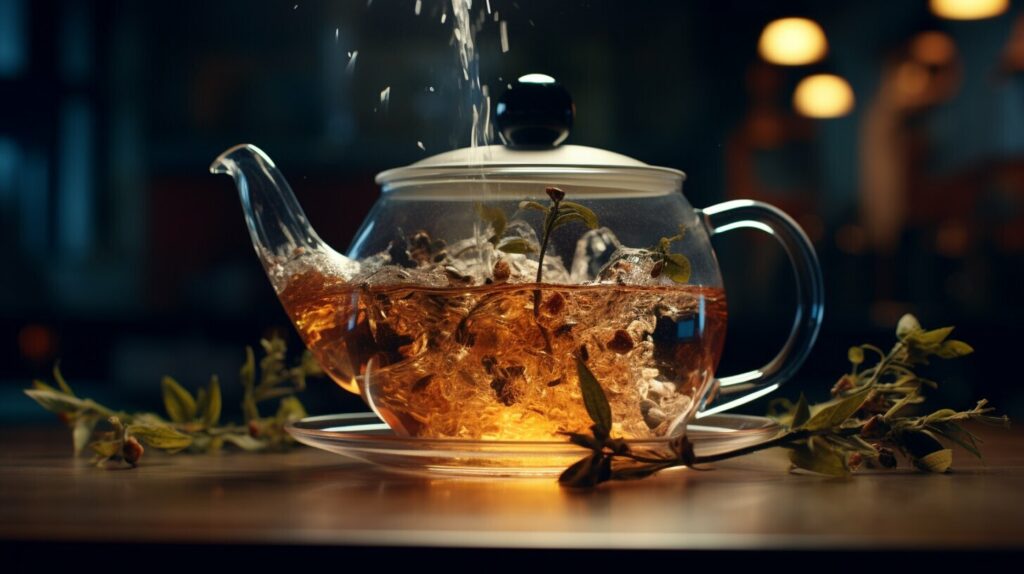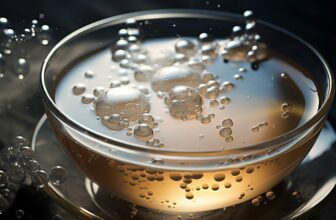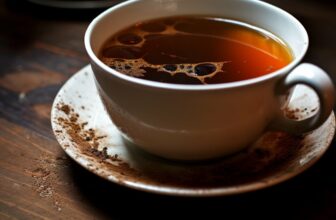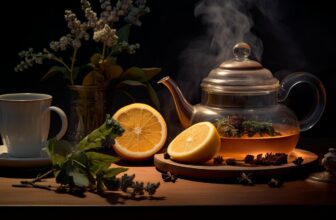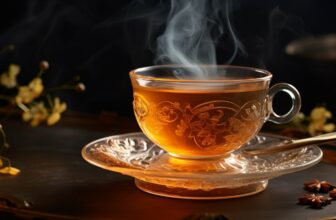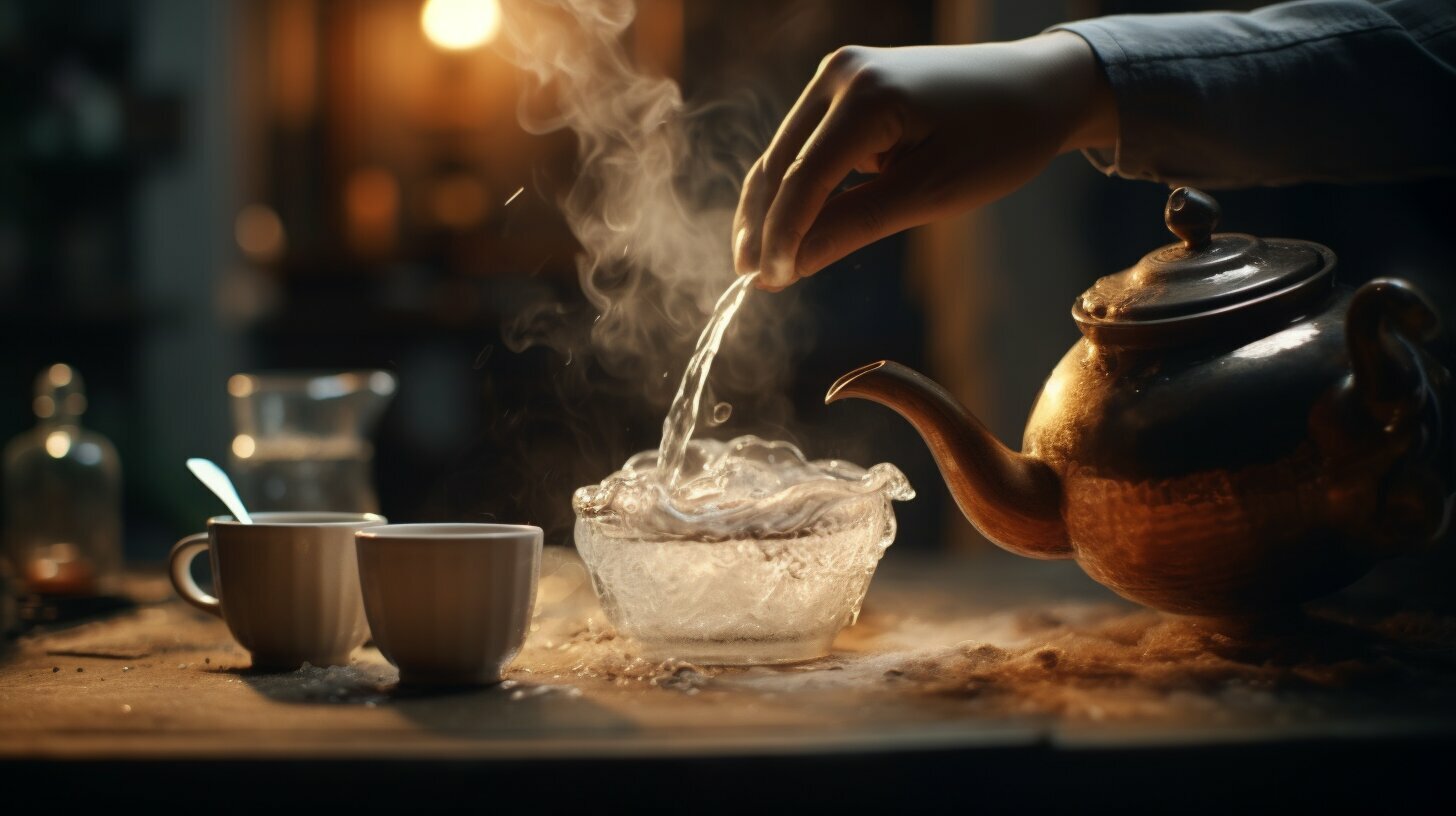
Have you ever brewed a cup of tea only to find that it lacks the robust flavor you were expecting? If your tea tastes like water, there may be a few reasons behind it. In this article, I will explore the possible factors that can contribute to this problem and provide solutions to enhance the flavor of your tea.
Key Takeaways:
- Inadequate steeping time or temperature can result in weak and watery flavors.
- Adjusting the steeping time and using the recommended water temperature can help improve the taste.
- The quality of water used to brew the tea can affect its flavor. Filtering the water or using spring water may make a difference.
- Purchasing tea from reputable brands can ensure better quality and avoid the problem of stale or low-quality tea.
- Following proper tea-to-water ratios is important to achieve the desired flavor intensity.
Tea flavor is also subjective, and personal preference plays a role. It’s worth exploring different types of teas and revisiting them at a later time to find ones that suit your taste.
By addressing these factors and experimenting with different brewing methods, you can overcome the problem of tea tasting like water and enjoy a more flavorful cup of tea.
Possible Reasons for Tea Tasting Like Water
There are several reasons why your tea might taste like water, and understanding these factors can help you troubleshoot and improve your tea experience. One possible reason is inadequate steeping time or temperature, which can result in weak and watery flavors. When tea is steeped for too short a time or at a low temperature, the flavor compounds in the tea leaves are not fully extracted, leading to a lack of flavor intensity.
To address this issue, it’s important to adjust the steeping time and use the recommended water temperature for different types of tea. Black teas, for example, generally require higher water temperatures and longer steeping times compared to green or white teas. By following the correct steeping instructions, you can ensure that the tea’s flavors are fully developed and not diluted.
Another factor that can contribute to tea tasting like water is the quality of water used in the brewing process. The mineral content, pH level, and overall purity of the water can affect the flavor of the tea. Tap water, for instance, may contain chlorine or other chemicals that can alter the taste of the tea. To overcome this, consider using filtered water or spring water, which can provide a cleaner and more neutral base for brewing your tea.
| Reasons for Tea Tasting Like Water | Solutions |
|---|---|
| Inadequate steeping time or temperature | Adjust the steeping time and use the recommended water temperature for different types of tea. |
| Poor water quality | Filter the water or use spring water to ensure a cleaner and more neutral base for brewing. |
| Low-quality or stale tea | Purchase tea from reputable brands and ensure it is fresh for the best flavor. |
| Improper tea-to-water ratios | Follow the recommended tea-to-water ratios to achieve the desired flavor intensity. |
| Personal preference | Try different types of tea and revisit them at a later time to explore and discover your preferred flavors. |
Lastly, the quality of the tea itself can also contribute to its watery taste. Low-quality or stale tea leaves may lack the essential oils and compounds that give tea its distinctive flavors. To enhance the taste of your tea, it’s recommended to purchase tea from reputable brands that prioritize freshness and quality.
Additionally, it’s important to follow proper tea-to-water ratios when brewing. Using too little tea with too much water can result in a weak and diluted flavor, while using too much tea can make it overly strong and bitter. By following the recommended ratios, you can strike a balance and achieve the desired flavor intensity.
Finally, personal preference plays a role in tea flavor. Not all teas may appeal to everyone’s taste, and it’s worth exploring different types of tea to find ones that suit your palate. It’s also worth noting that taste preferences can change over time, so revisiting teas that you may not have enjoyed in the past might yield different and more enjoyable results.
Inadequate Steeping Time or Temperature
One possible reason for your tea tasting like water is that you may not be steeping it long enough or at the right temperature. Steeping time and temperature greatly influence the flavor extraction process, and if not properly managed, can result in weak and watery flavors.
When steeping tea, it is important to follow the recommended steeping times provided on the tea packaging. Different types of tea require different steeping times to fully develop their flavor. For example, green teas generally require shorter steeping times of around 2-3 minutes, while black teas may require 4-5 minutes. Steeping tea for too short a time can lead to underdeveloped flavors and a weak taste.
Another factor to consider is the water temperature. Water that is too hot can scorch the tea leaves and result in a bitter taste, while water that is too cool may not extract enough flavor. Different teas have different temperature requirements, so it is essential to pay attention to the recommended temperature range. As a general guideline, green teas should be steeped at lower temperatures around 160-180°F (70-82°C), while black teas can handle higher temperatures around 200-212°F (93-100°C).
Taking the time to adjust your steeping time and temperature can make a significant difference in the flavor of your tea. Experiment with different steeping times and temperatures until you find the perfect balance that brings out the desired flavors and aromas in your tea.
Table: Recommended Steeping Times and Temperatures for Different Types of Tea
| Type of Tea | Steeping Time | Water Temperature |
|---|---|---|
| Green Tea | 2-3 minutes | 160-180°F (70-82°C) |
| Black Tea | 4-5 minutes | 200-212°F (93-100°C) |
| Oolong Tea | 3-5 minutes | 185-205°F (85-96°C) |
| Herbal Tea | 5-7 minutes | 200-212°F (93-100°C) |
Remember, the journey to a perfect cup of tea is all about finding the right balance. By adjusting your steeping time and temperature, you can elevate your tea-drinking experience and enjoy a more flavorful brew.
Adjusting Steeping Time and Temperature
To fix the issue of weak and watery tea, try experimenting with different steeping times and water temperatures until you find the right balance. Steeping time refers to the duration that the tea leaves are left in hot water to infuse. If your tea tastes weak, it could be because you’re not giving it enough time to release its flavors. On the other hand, if your tea tastes bitter or astringent, it could be because you’re steeping it for too long.
The optimal steeping time will depend on the type of tea you’re brewing. For delicate teas such as green or white tea, a shorter steeping time of 1-3 minutes is usually recommended. For black or herbal teas, a longer steeping time of 3-5 minutes is often advised. Adjusting the steeping time can help extract the desired flavors and improve the overall taste of your tea.
Similarly, water temperature plays a crucial role in tea flavor. Different types of tea require different water temperatures to achieve optimal flavor. For example, green tea is best brewed at a lower temperature of around 175°F (80°C), whereas black tea can be brewed with hotter water around 195°F (90°C) to 205°F (96°C). Using water that is too hot can result in a bitter taste, while water that is too cool may not fully extract the flavors of the tea leaves. It’s worth investing in a good quality kettle with temperature control or using a thermometer to ensure the water is at the right temperature for brewing.
By adjusting the steeping time and temperature according to the type of tea you’re brewing, you can enhance the flavor and enjoy a more satisfying cup of tea. Remember, finding the perfect balance may require some trial and error, but the effort will be worth it when you achieve that delightful, full-bodied flavor in your tea.
Consider the Quality of Water Used
The type of water you use to brew your tea can have a significant impact on its flavor and taste. If your tea is lacking flavor, it may be because of the water you are using. Tap water, for example, can contain impurities and chemicals that affect the taste of your tea. To improve the flavor, consider filtering the water or using spring water instead.
A study conducted by the Journal of Agricultural and Food Chemistry found that using filtered or spring water resulted in a better tasting cup of tea compared to tap water. The removal of chemicals such as chlorine and heavy metals allowed the true flavors of the tea to shine through. So, investing in a water filter or opting for spring water can make a noticeable difference in the taste of your tea.
Another consideration is the water temperature. Different types of tea require different water temperatures for optimal flavor extraction. For example, green tea typically benefits from lower water temperatures around 170°F (77°C) to prevent bitterness, while black tea can handle higher temperatures around 212°F (100°C). Ensuring the water is at the right temperature can enhance the taste and prevent your tea from tasting weak or watery.
Remember, the quality of water used to brew your tea is just as important as the tea leaves themselves. Experiment with filtering the water or using spring water to see if it improves the flavor. And don’t forget to adjust the water temperature according to the type of tea you’re brewing. These simple steps can help you achieve a more flavorful and enjoyable cup of tea.
Ensure Tea Quality
If your tea consistently tastes like water, it’s possible that the tea itself is of low quality or past its prime. The flavor and aroma of tea can deteriorate over time, especially if it’s not stored properly. To ensure the best flavor, it’s important to choose high-quality tea from reputable brands.
When purchasing tea, opt for loose leaf tea instead of tea bags whenever possible. Loose leaf tea tends to be of higher quality and provides a more robust flavor. Look for teas that are sourced from reputable tea estates and have been processed and stored correctly.
Before making a purchase, take a moment to examine the tea leaves. They should be whole and intact, without any signs of discoloration or dust. Avoid teas that look dull or have a stale smell. Fresh, good-quality tea will have vibrant colors and a pleasant aroma.
Remember that tea is a delicate product, and it’s best consumed within a certain timeframe. While it doesn’t go bad like perishable food, it can lose its freshness over time. To enjoy the best flavor, store your tea in airtight containers away from heat, light, and moisture. This will help preserve its flavor and aroma for a longer period.
Types of Tea and Their Flavors
Every type of tea has its own unique flavor profile. Black teas tend to be bold and robust, while green teas offer a more grassy and vegetal taste. Herbal teas can be floral, fruity, or spicy, depending on the ingredients used. Exploring different types of tea can be an exciting journey to discover your personal favorites.
Experiment with different blends and varieties to find teas that suit your taste buds. You may be surprised to find that some teas you didn’t enjoy before taste completely different when prepared using the correct brewing methods.
| Type of Tea | Flavor Profile |
|---|---|
| Black Tea | Rich, robust, and sometimes malty |
| Green Tea | Grassy, vegetal, and sometimes nutty |
| Oolong Tea | Floral, fruity, and sometimes toasty |
| Herbal Tea | Variety of flavors, including floral, fruity, and spicy |
| White Tea | Delicate, subtle, and sometimes sweet |
By paying attention to tea quality and exploring different varieties, you can elevate your tea-drinking experience and savor the rich and satisfying flavors that tea has to offer.
Follow Proper Tea-to-Water Ratios
Getting the right balance between tea and water is crucial in ensuring a flavorful cup of tea. The amount of tea leaves or tea bags used, as well as the quantity of water, can greatly affect the taste. Using too little tea or too much water will result in a weak and watery flavor, while using too much tea or too little water can lead to an overpowering brew.
Follow these recommended ratios for the perfect cup of tea:
- Black tea: 1 teaspoon of tea leaves per 8 ounces of water
- Green tea: 1 teaspoon of tea leaves per 8 ounces of water
- Herbal tea: 1 tablespoon of tea leaves per 8 ounces of water
Remember, these ratios can be adjusted according to personal preference. If you prefer a stronger flavor, you can increase the amount of tea leaves slightly, but be careful not to go overboard.
Experiment with Different Ratios
If your tea still tastes like water, don’t be afraid to experiment with different ratios. You may find that increasing or decreasing the amount of tea, or adjusting the water quantity, can significantly improve the flavor. Keep a record of the ratios you try and the results you achieve. This way, you can fine-tune your brewing method and create a personalized brewing guide tailored to your taste.
Tea brewing is an art, and finding the perfect balance between tea and water requires practice and experimentation. With patience and a willingness to try new combinations, you’ll soon discover the delightful flavors that tea can offer.
| Type of Tea | Tea-to-Water Ratio |
|---|---|
| Black Tea | 1 teaspoon of tea leaves per 8 ounces of water |
| Green Tea | 1 teaspoon of tea leaves per 8 ounces of water |
| Herbal Tea | 1 tablespoon of tea leaves per 8 ounces of water |
Personal Preference Plays a Role
It’s important to acknowledge that not all teas appeal to everyone’s taste buds, and what may taste like water to one person might be perfect for another. Tea, like any beverage, is subjective, and personal preference plays a significant role in how we perceive its flavor. Some individuals prefer light and delicate teas, while others enjoy bold and strong flavors. Therefore, if your tea tastes like water, it might be worth exploring different types of tea to find one that suits your taste better.
Experimenting with various teas can be an exciting journey of discovery. Consider trying different varieties, such as black, green, white, oolong, or herbal teas. Each type has its own unique characteristics and flavor profiles, allowing you to find the perfect cup of tea that satisfies your taste buds.
Trying the same tea at different times can also yield different results. Our taste preferences can change over time, so don’t be discouraged if a tea that tasted like water previously suddenly becomes enjoyable after a break. Keep an open mind and revisit teas that you may have dismissed in the past, as your taste buds may have evolved.
In conclusion, if your tea tastes like water, don’t despair. There are numerous factors at play, and personal preference is one of them. Explore different teas, experiment with brewing methods, and give yourself the opportunity to discover a tea that truly delights your taste buds. Remember, the beauty of tea lies in its versatility, and finding the perfect cup is a journey well worth taking.
Conclusion
Understanding the reasons behind your tea tasting like water and implementing the suggested solutions can help you unlock the full potential of your tea-drinking experience.
If you find that your tea lacks flavor, consider adjusting the steeping time and temperature. Inadequate steeping time or using water that is too hot or too cold can result in a weak and watery taste. By following the recommended steeping time and water temperature for different types of tea, you can enhance the flavor and aroma.
The quality of water used can also impact the taste of your tea. Tap water may contain impurities or additives that can affect the flavor. Filtering the water or using bottled spring water can help improve the overall taste and clarity of your tea.
It is essential to consider the quality of the tea itself. Low-quality or stale tea can result in a lack of flavor and a watery taste. Purchasing tea from reputable brands and ensuring it is fresh can make a significant difference in the overall taste experience.
Following the proper tea-to-water ratios is crucial for achieving the desired flavor intensity. Using too little tea or too much water can lead to a weak and diluted taste, while using too much tea or too little water can result in a strong and overpowering flavor. Finding the right balance will allow you to savor the full range of flavors in your tea.
Lastly, personal preference plays a role in the enjoyment of tea. Not all teas may appeal to everyone’s taste buds. Exploring different types of tea and revisiting them at a later time can provide new insights and surprises. Keep experimenting and trying new teas to find the ones that suit your palate and bring you the most enjoyment.
FAQ
Q: Why does my tea taste like water?
A: There are several possible reasons for your tea tasting like water. Inadequate steeping time or temperature, low-quality water, stale or low-quality tea, and personal preference can all play a role in the flavor. Adjusting steeping time and temperature, using filtered or spring water, purchasing high-quality tea, following proper tea-to-water ratios, and exploring different teas can help improve the taste.
Q: How can I fix tea that tastes like water?
A: To improve the flavor of tea that tastes like water, you can adjust the steeping time and temperature. Increase the steeping time for a stronger flavor and use the recommended water temperature. Additionally, consider using filtered water or spring water, as the quality of water can affect the taste. Purchasing tea from reputable brands and ensuring it is not stale or of low quality is also important for a more flavorful cup of tea.
Q: Why does the quality of water used affect the flavor of my tea?
A: The quality of water used to brew tea can impact the flavor. Impurities or minerals in the water can alter the taste of the tea. Filtering the water or using spring water can help remove any unwanted elements and result in a more enjoyable cup of tea.
Q: How does tea quality affect the flavor?
A: The quality of tea itself can significantly impact the flavor. Stale or low-quality tea may taste weak and watery. It is recommended to purchase tea from reputable brands known for their high-quality products. Opting for fresher teas and avoiding tea that has been sitting for too long can help improve the taste.
Q: What is the proper tea-to-water ratio for a flavorful cup of tea?
A: Following the recommended tea-to-water ratios is essential for achieving the desired flavor intensity. Generally, a ratio of one teaspoon of loose tea or one tea bag per 8 ounces of water is a good starting point. However, adjust according to personal preference and the type of tea being brewed.
Q: Can personal preference affect the taste of tea?
A: Absolutely! Personal preference plays a significant role in how we perceive taste. Not all teas may appeal to everyone’s taste buds. Experimenting with different teas and revisiting them at a later time may yield different results. Don’t be afraid to try new flavors and varieties until you find the ones that suit your preferences.

